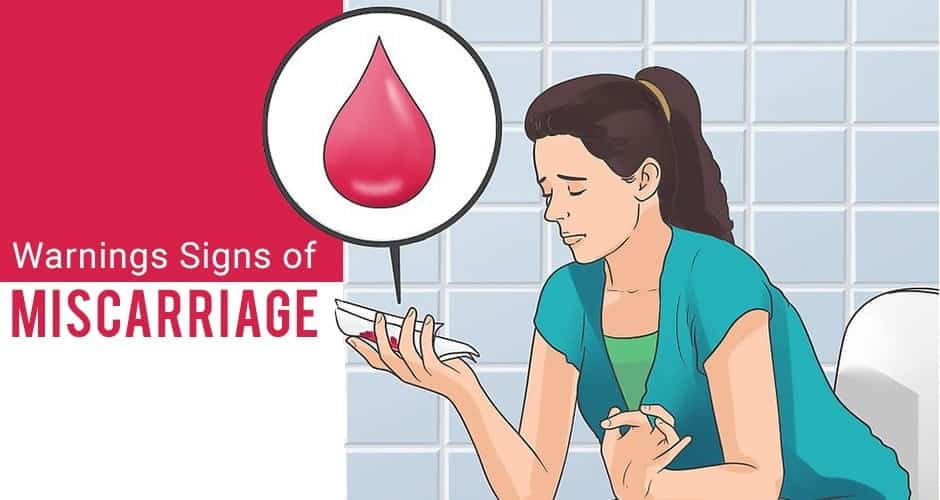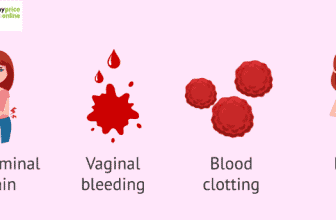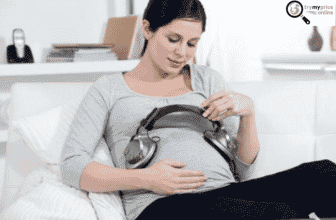
Signs of Miscarriage: A positive pregnancy test fills the parents with an overwhelming happiness as they are expecting a new family member to cheer up their lives. It’s an incomparable moment that all parents wait for; however, not all pregnancies end in full term. Some pregnancies end in miscarriage: fetal death before the gestational age of 20 weeks as this is the cutoff date before which the fetus can’t survive outside the womb. Having a miscarriage can leave you feeling extremely disappointed and anxious about how this will affect your future pregnancies.
However, there is no need to worry as 10 to 25 percent of pregnancies end in miscarriages, with 85 percent occurring in the first trimester. Most women will have their miscarriage even before they know they are pregnant as most miscarriages happen in the first few weeks that they are confused for late heavy periods. Only 10 percent of women will have their miscarriage after they know they are pregnant. A miscarriage happens due to various reasons but does not affect future pregnancies and is not the fault of either parent.

Signs of Miscarriage: Cause, Sign, Symptoms, Prevention, Treatment
What Causes a Miscarriage? The most common reason for miscarriage is an abnormality in the fetal chromosomes. Other causes of miscarriage include high ...

Signs of Miscarriage: Cause, Sign, Symptoms, Prevention, Treatment
A positive pregnancy test fills the parents with an overwhelming happiness as they are expecting a new family member to cheer up their lives.
What Causes a Miscarriage?
A miscarriage happens due to many different reasons but the most common reason for miscarriage is an abnormality in the fetal chromosomes. An abnormality in either the number or the structure of DNA will cause improper development of the fetus leading to lower chances of his or her survival. Examples include a complete mole where the fetus contains two pairs of paternal chromosomes or partial moles where the embryo has two pairs of paternal chromosomes with one pair of maternal chromosomes.
So as a result the uterus expels its content early in pregnancy; thereby, saving the mother unnecessary efforts and blood loss to a weak fetus incapable of survival. Chromosomal abnormalities are the fault of neither of the parents and 85 percent of miscarriage is followed by healthy pregnancies.
Other causes of miscarriage include a high maternal age during pregnancy, severe infection, uterine abnormalities, anti-phospholipid syndrome, diabetes or hypertension in mother, or cervical incompetence. Also factors may be external as smoking or drinking alcohol. However, all of these causes contribute to less than 10 percent of all miscarriages. Most of these causes can be treated once diagnosed making sure no further miscarriages occur. Cervical incompetence specifically can be spotted as it causes the miscarriage of a viable fetus in the second trimester, not the first as most other causes.
What are the Signs of Miscarriage?
Miscarriage, which is also known as abortion, is by definition the expelling of uterine contents before the 20th week of gestation; so the most definitive sign is vaginal bleeding. Spotting in early pregnancy is common and shouldn’t cause any worries as it is most probably implantation bleeding. Heavy vaginal bleeding however is what should make you concerned. If it occurs before 4 weeks of gestation, it will most probably pass unnoticed unless you are trying and regular perform pregnancy tests after ovulation.
This is because the miscarriage bleeding will coincide with the normal date of your period, and tge amount of bleeding will only be slightly increased. Also by that date, the fetus is about the size of a grain of rice so it is hard to notice by the naked eye amongst the bleeding.
However, miscarriages that occur after the fourth week are a bit easier to detect. This is because the size of the baby increases to be visible to the naked eye, and the vaginal bleeding becomes heavier with large clots. And as the weeks pass by, the mother will probably notice that her period is late and perform a pregnancy test so any bleeding will cause her worries.
If she went to the doctor to confirm the pregnancy and again after the bleeding, the doctor can detect a rupture of membranes, a definite sign of miscarriage, by clinical examination. Also on examination by ultrasound, the sac will be missing and the uterus will be back to empty. So can you actually see the fetus in the vaginal bleeding of miscarriage? Starting six weeks, the baby is in a sac and is about the size of a fingernail.
You can notice a small sac with a piece of tissue attached to it; that is a placenta. At 8 weeks, the baby is more developed and started having tiny feet, hands, and if you look closely you can see the eyes.
At 10 weeks, the baby is more fully developed with little fingers, arms, legs, and toes but is still inside the sac.
Starting 12 weeks, the baby is probably already outside the sac and can be seen attached to the placenta by the umbilical cord.
At this gestational age, vaginal bleeding may be preceded with a watery discharge, that is the amniotic fluid. At all stages of miscarriage, it is recommended that you keep a piece of the discharge as your doctor will probably recommend having it examined.
What are the Symptoms of Miscarriage?
The symptoms of miscarriage highly vary from one woman to another. This is due to both personal factors as pain tolerance and medical factors as symptoms vary according to the type of miscarriage.
To begin with, there are general symptoms for all types of miscarriages that will be experienced by most women. These include vaginal bleeding, lower abdominal cramping, rapid loss of weight, lower back pain, true labor pains felt at a regular interval, and disappearance of pregnancy symptoms if present.
These pregnancy symptoms include morning sickness and breast tenderness. The disappearance of these symptoms is not a definitive sign as they normally come and go, but they may help you notice the other symptoms.
Another factor that will affect the symptoms you will experience is the type of miscarriage. There are 5 types of miscarriage: threatened abortion, inevitable abortion, complete abortion, incomplete abortion and missed abortion.
Threatened miscarriage is when the miscarriage starts to happen but the cervix is still closed; so the most prominent signs will be light vaginal bleeding and abdominal cramps. This is the only type of miscarriage in which the pregnancy may continue normally. Inevitable abortion is when miscarriage starts to happen and the cervix is open; it may start as light vaginal bleeding but later all symptoms will be prominent.
Abdominal cramps will be more severe and the fetus will be passed away in the bleeding. Complete and incomplete abortion is when the uterus is already emptying its contents and the fetus has separated from the uterine wall.
Bleeding is severe and occurs over a few days with true uterine contractions causing severe abdominal pain. Last is missed miscarriage where abortion is already complete, cervix is closed, and no symptoms whatsoever where experienced but fetal loss on ultrasound.
Difference Between Miscarriage and Normal Period
You might have an increased amount of bleeding this month, and you are starting to get worried about whether that is a loss of pregnancy or just a heavy period. Both events are accompanied by heavy bleeding, abdominal cramps, and lower abdominal cramps. Also early miscarriages occur a week or so after the normal time of your menses. However, the pain of miscarriage is usually more severe and the lower back pain is more intense.
And as more weeks pass by before the miscarriage occurs, the more prominent the symptoms such as heavy bleeding which is accompanied by blood clots and loss of fetal tissue. The only definite difference is that if you took a pregnancy test after the delay of your period.

How to Confirm a Miscarriage at Home?
The surest sign for confirmation is a positive pregnancy test followed by a negative one. Urine pregnancy tests are easily available in pharmacies and shops. Seeing a fetus among the heavy vaginal bleeding is another sure sign.
However, all other symptoms are only suggestive and a sure diagnosis has to be done by a physician by both a clinical pelvic examination and an ultrasound. An ultrasound will show an empty uterus or loss of fetal heartbeats. This is the diagnostic sign of miscarriage along with a dilated open cervix.
Prevention of Miscarriage
The treatment of miscarriage depends on the time of its occurrence. Once a miscarriage starts, there is nothing to do to prevent its occurrence.
The main goal of the treatment in this case is to prevent excessive bleeding and infection and to relieve the symptoms. In cases of threatened abortion, your health care provider might suggest abstaining from sexual intercourse until the symptoms subside.
Some doctors recommend bed rest or using progesterone supplements but that is not scientifically based. However in most cases, the miscarriage will still happen. Taking painkillers will help alleviate both the pain and the fever.
Treatment of a Miscarriage
The earlier the miscarriage, the more likely the body will be able to complete the miscarriage on its own, resulting in a missed or a complete abortion. The first step is doing an ultrasound to make sure that there are no retained fragments that may act as a foreign body that will attract infection.
Your doctor will suggest taking a course of antibiotics to avoid any infection from entering your body through the open cervix even in cases of an empty uterus. In case there are any retained fragments, a dilatation and curettage will be done to empty the uterus.
An important thing that should be considered when treating a miscarriage is the psychological state of the mother. Even if the mother didn’t see her child, going through a pregnancy loss is very difficult for the mother. Always remind the mother that a miscarriage is a result of nature’s mercy, and that this is not her or her spouse’s fault. Reassure her that she can have a normal pregnancy as any other woman.
Make sure she is surrounded by friends and family who will help her make it through. Emotional support after a miscarriage is extremely important.
Prevention of Repeated Miscarriage
Since the main cause of miscarriage is chromosomal abnormalities, there is not much to do to prevent its occurrence. But there are a few things to do to help maintain a normal pregnancy:
- Make sure you have no infections before trying to get pregnant. Adopting a healthy diet and exercising regularly so that you maintain a healthy weight.
- Make sure to take your vitamin supplements including folic acid. Avoid alcohol and smoking before and after pregnancy.
- Once you know you are pregnant, avoid vigorous exercise that may cause injuries to your body.
- Avoid exposure to radiation as it may chromosomal abnormalities to your baby leading to a miscarriage.
- Try drinking less caffeine limiting your intake to 2 cups a day.
- Ask your doctor before taking any medications to make sure they are safe during pregnancy.
Should I Go to the Hospital After a Miscarriage?
If you have a vaginal bleeding that soaks more than one super large pad, consider visiting a hospital. It is important to see your doctor to make sure the miscarriage is complete and that there is no retained tissue inside your uterus.
This is confirmed by an ultrasound; and if there are any fragments seen, a dilatation and curettage has to be done as soon as possible. This is done to make sure the bleeding stops and to help avoid severe infection. Also, a doctor might want to examine the lost fetus to confirm the cause of miscarriage as molar pregnancies for instance need further management. So if you suspect that you are having a miscarriage, visit the nearest hospital.
What Does a Hospital Do When I Have a Miscarriage?
Many procedures are done starting with an ultrasound that may be followed by a dilatation and curettage as we mentioned earlier. Also an ultrasound will exclude organic causes of abortion as it will view the structure of your genital organs.
Blood test may be done to exclude some causes of miscarriage as anti-phospholipid syndrome which causes repeated miscarriages. Other tests that may be done include a CBC to assess the severity of the hemorrhage, an RH test for you and your baby.
If you are Rh negative and the baby was positive, you will need an antibody injection. This will make help avoid any future blood incompatibilities that may cause serious problems.
Since chromosomal abnormalities cause about 90 percent of abortions, doctors don’t do full investigations searching for a cause before 2 successive pregnancy losses.
To Sum Up!
Miscarriages or Chemical Pregnancy losses occur in 1 of each 3 pregnancies, and are a common incidence. They should not leave you worried as they are usually followed by a normal pregnancy and do not affect your fertility in any way.
The most common cause of miscarriage is fetal chromosomal abnormalities and is not the fault of the mother or her husband. A miscarriage passes unnoticed in 75 percent of pregnancies as it usually occurs very early in the first trimester.
If it occurs later than that, make sure to see your doctor to make sure the uterus has completely emptied itself and do all other necessary investigations and procedures. Most importantly, the mother needs emotional support after a miscarriage so make sure she is in a friendly environment that cares about her so that she can make it through.














[…] Spotting: now that is a symptom to worry about. Spotting is normal now, especially that your vagina is being so sensitive. So simple actions like having sex can cause it, and that is fine. But if it is bleeding or occurring more often than not, then you might need to call the doctor. Just to be on the safe side. If however this bleeding or spotting is accompanied by cramps, then do not hesitate to contact or visit your doctor right away. As this could be a sign of miscarriage. […]